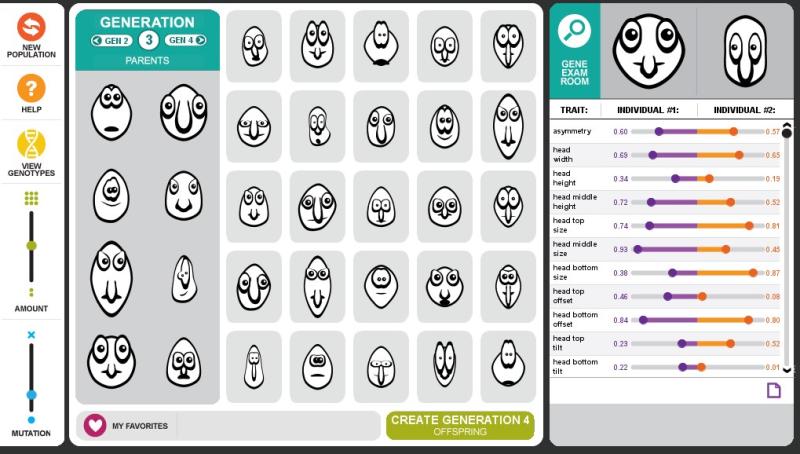Reading the Code: Genetic Literacy
Summary
Through the creation of a problem-based learning computer simulation, this project will provide a learning technology that crosses mathematics, science, and social studies.

Project Team
Project Coordinator
Dr. Rick Voithofer, School of Educational Policy and Leadership
ACCAD Project Supervisor
Dr. Matthew Lewis
ACCAD Graduate Research Assistants
Jonathan Eisenamann, Computer Science Engineering
Lindsay Beach, Design
Co-PIs
Kathy Trundle, School of Teaching and Learning, Science Education
Dr. Adrienne Dixson, School of Teaching and Learning, Social Studies
Dr. Diana Erchick, School of Teaching and Learning, Mathematics Education
Schools Liaison
Matt Marx, School of Educational Policy and Leadership
Partners
Columbus City Schools: Sherwood Middle School and Newark City Schools: Wilson Middle School
Funding provided by: The Battelle Endowment for Technology & Human Affairs (BETHA)
Project Description
This project addresses the emerging need for genetic literacy. Through the creation of a problem-based learning computer simulation, a learning technology is provided to middle school teachers and students that crosses mathematics, science, and social studies aspects of genetics. This helps the leaders, STEM workers, and citizens of tomorrow understand the impact of the growing body of genetic knowledge and increasing capacity for genetic manipulation. To address this goal a genetic evolutionary design system was developed to serve as the platform for demonstrating genetic concepts. Appealing animated cartoon faces can be selected, mated, and mutated, allowing the evolution of traits chosen by the software user.
The Co-PI’s from the College of Education and Human Ecology provided expertise in the areas of Mathematics education (Dr. Erchick), Social Studies education (Dr. Dixson), Science education (Dr. Trundle), and the development of educational technologies (Dr. Voithofer). The Co-PIs worked with Dr. Matthew Lewis and a team of graduate students at Advanced Computing Center for the Arts and Design (ACCAD). Dr. Lewis and his graduate students have been researching, designing, and developing visual interfaces that harness genetic algorithms to create interactive evolutionary design tools for over a decade.
Key Concepts Explored
- Mathematics
- Randomness
- Experimental vs. theoretical probability
- Multiple visual representations of mathematics knowledge
- Basic arithmetic skills
- Proportions
- Numerical concepts
Natural Science
- Diversity
- Traits
- Phenotypes
- Gene
- Heredity
- Inheritance
- Genetic Variability + variation
- Inherited vs. learned traits
- Fitness
- Adaptation
Social Studies
- History
- People in society
- Citizenship rights + responsibilities
- Government
- Social studies skills + methods
Completion Date: June 30, 2011
Information Contact:
Dr. Rick Voithofer (rvoithofer@ehe.osu.edu)
School of Educational Policy and Leadership
College of Education and Human Ecology
104 Ramseyer Hall
29 W. Woodruff Ave
Voice (614) 247-7945 Fax (614) 292-7900
